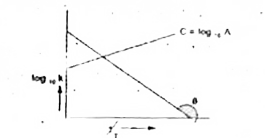The rate constant of a reaction increases by 5% when its temperature is raised from 27∘c to 28∘c. The activation energy of the reaction is
36 kJ/mol
16.6 kJ/mol
46.6 kJ/mol
26.6 kJ/mol
log.k2k1=Ea2.303R[T2−T1T1T2]
log.150100=Ea2.303×8.314[1300×301]
or Ea=(log1.05)×2.303×8.314×300×301
=36.65kJ
Topper's Solved these Questions
Similar Questions
The specific rate constant of a particular reaction quadruples when temperature is changed from 27∘ to 47∘C. Find activation energy for the reaction.
View SolutionThe rate constant of a reaction increases by five times on increase in temperature from 27∘C to 52∘C . The value of activation energy in kJmol−1 is ______ (Rounded-off to the nearest integer)
View Solution
Knowledge Check
- Question 1 - Select One
When the temperature is increased, heat is supplied which increases the kinetic energy of the reacting molecules. This shall increase the number of collisions and ultimately the rate of reaction shall be enhanced. Arrhenius suggested a equation which describes K as a function of temperature, i.e.
k=Ae−Ea/RT
where
k= rate constant
A= a constant (frequency factor)
Ea= energy of activation
log10k=log10A−Ea2.303R[1R]
Y=C+MX
It is the equation of straight line with negative slope. On plotting log10k against [1T] we get a straight line as shown below :

The slope gives activation energy and intercept gives frequency factor.
Also log.k2k1=Ea2.303[T2−T1T1T2]
The rate constant of a reaction is increased by 5% when its temperature is raised from 27∘C to 28∘C . The activation energy of the reaction in kJ/mol isA36.6B16.6C46.6D26.6 - Question 2 - Select One
The rate of a reaction becomes 4 times when temperature is raised from 293 K to 313 K. The activation energy for such reaction would be
A50.855 kJ mol−1B52.849 kJ mol−1C54.855 kJ mol−1D56.855 kJ mol−1 - Question 3 - Select One
A particular reaction rate increases by a a factor of five when the temperature is increased from 5∘ to 27∘ C. What is the activation energy of the reaction?
A6.10 KJ .mol−1B18.9 KJ .mol−1C50.7 KJ .mol−1D157 KJ .mol−1
If the rate of a reaction gets doubled as the temperature is increased from 27∘ to 37∘C. Find the activation energy of reaction?
View SolutionThe rates of most reactions double when their temperature is raised from 298 K to 308 K. Calculate their activation energy.
View SolutionThe rate constant of a reaction increases by 7% when its temperature is raised from 300 K to 310 K, while its equilibrium constant increases by 3%. Calculate the activation energy of the forward and reverse reactions.
View SolutionThe specific rate constant for a reaction increases by a factor of 4, if the temperature is changed from 27∘C to 47∘C. Find the activation energy for the reaction.
View SolutionThe rates of most reactions double when their temperature is raised from 298 K to 308 K. Calculate their activation energy.
View Solution

